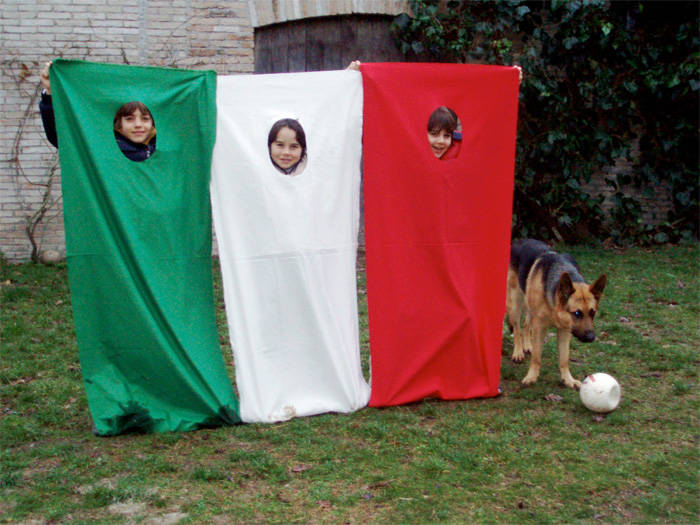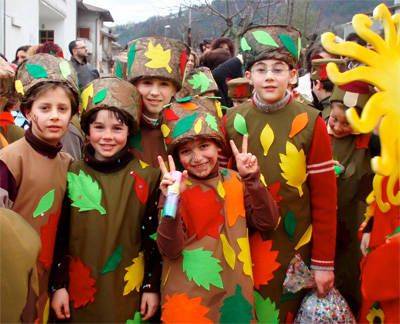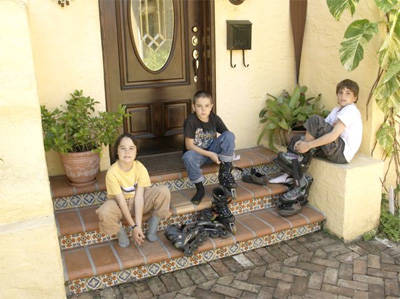Lo straniero (Part One)
Today, after three years of residence in centroitalia, I handed in my application for Italian citizenship.
When it comes through, in about two years, it will make my life here easier and only then will I enjoy a full complement of civil rights. But it’s not like it’s a red-letter day for me, something to celebrate. It leaves me almost melancholy, feeling diminished in my American-ness.
I’ve always disdained flag-wavers. I subscribe to the thesis that ostentatious patriotism is the refuge of jerks. That doesn’t mean, though, that I’m not very happy, deep down, to have been born in the USA.
I made the 20 minute drive from Fano, the little Adriatic coastal city where we live, up the two-lane highway bordering the shore to Pesaro, the provincial capital. The bureau for these procedures is in the prefettura, which is housed in a handsome 15th-century building, the former ducal palace, on the north side of the expansive main plaza, the Piazza del Popolo.
I found the appropriate office and sat in the waiting room with several other people, mostly younger folk, all extra-comunitari like myself. There was an Argentine couple in their 20s. They might have had Italian grandparents, which could make things easier for them. A West African woman about 30 years old was giving some valuable advice to a couple from Moldavia. She, the black woman, spoke excellent Italian and was gladly and generously trying to help them avoid some of the setbacks and pitfalls she had encountered along this sinuous trail toward a new nationalityFor my companions in this antechamber, Italian citizenship would represent considerable improvement of their chances for a modicum of prosperity, for a better life for themselves and their children. This was a momentous step for them, one fraught with hope.
My motivations were different. I didn’t come here for greater opportunity. My own country continues to be unmatched in the world for offering to its own citizens and to arrivals from around the globe a bountiful banquet of opportunity, along with the chance to experience and embrace the concepts of liberty and responsibility, the rule of law and individual rights as described so eloquently by those iconoclastic revolutionaries named Jefferson, Franklin, Adams and Madison. (Granted, Canada and Australia provide similar contexts. But even many Australians and Canadians emigrate to the United States every year. Why is that?)
Of course not everyone achieves The American Dream. The struggle leaves some by the wayside.
But most of those who reach U.S. shores and work for a degree of material security and a sense of belonging to a country that stands for something do indeed achieve most of their goals. In so doing, they become Americans. Something different and, in their own minds, better than what they were before.
I’m not Italian-American. I’m a typical American mongrel mix. Of my eight great-grandparents, three were German, two were Irish, two were Swiss and one was Dutch. But I grew up in New Jersey, which after New York has the biggest Italian-American community of any state. So throughout my childhood and adolescence, half or more of my friends and classmates were the children or grandchildren of immigrants from Italy. Mostly Sicilians and Neapolitans.
Stirling, where I went to middle school, was (and still is) more than 80 percent Italian.
My wife is Italian. Not Italian-American. Italian-Italian. We met 16 years ago when we both were working in Central America, in El Salvador. We had a whirlwind romance and got married and we had three children in rapid succession, in 1994, ’95 and ’96. All boys.
From birth they were dual citizens; American by way of dad and Italian through mom. But we spent most of their childhood in the United States, in Miami. To be precise, we lived in Coral Gables, a lovely residential municipality of Greater Miami. The kids, naturally, became more American than Italian, even though their mother, Nicoletta, did an admirable job of making sure they learned her language.
“Non capisco se mi parli in inglese,” she insisted for months on end, feigning incomprehension when, at the age of around 4 the kids, immersed in pre-school and American daily life, wanted to use English inside as well as outside the house, where up until that point either Spanish or Italian or a pidgin of the two had prevailed.
More than eight years went by. And we were happy there. Then, three years ago, when Bruno was 12 and Joseph was 10 and Tobias was 9, Nico and I decided to move to Italy.
I’d spent some time here, and liked this country. I spoke the language fairly well. (My Spanish, which had become almost a second native tongue after 13 years of work in Latin America, helped.) It was Nicoletta’s homeland and in my mind it harbored a wealth of history and culture. My college roommate for four years was a Cuban intellectual who turned me on to “foreign” cinema in the 1970s, and Cornell had three small theaters on campus that held several retrospectives or mini-festivals every year. I loved the movies of Ettore Scola, Lina Wertmuller, the brothers Taviani. Italy in the early 21st century seemed to Nico and I a fundamental part of both the Old and New Europe, and as such an eminently interesting place for us and our kids.
This was our reasoning: If we, because of our particular circumstances, were able to bestow on our children the extravagant gift of becoming full partakers of and participants in two worlds, then we would be almost negligent not to do it.
In the late summer of 2006, it became a matter of Now or Never. Bruno had finished his first year of middle school. He spoke passable Italian, but his entire academic formation had been in the States. He’d never been instructed in the intricacies of Italian grammar, the formal study of which is a big part of elementary school here. He could not write in that language. So seventh grade seemed to us the last point at which we could drop him into the Italian public school system with the expectation that he’d be able to catch up. Waiting any longer might be asking too much of him.
We came. And the kids have done great. In school and out. They now enjoy that rare condition of being absolutely bi-cultural. If you see them in an American context surrounded by American kids, they are indistinguishable in idiom and mannerism from their mates. The same goes for here. Unless you know their background, if you watch and listen to them on the beach in Fano, playing with their pals, you would think they were born and raised here.
By the time they finish high school, though, they will think of themselves as (and thus be) more Italian than American. I believe they will retain a good dose of their American-ness in their psyches and hearts. I’m still pleasantly surprised by the fact that, 38 months into our life on this side of the ocean, they still speak to each other in American English. I thought they would have switched to Italian by now.
But how do I feel about the prospect that their principal cultural identity – their framework of cardinal references and signposts – will be predominantly Italian? That they probably will not feel, like I do, a visceral attachment to and a kind of spiritual kinship with Bob Dylan and Jackie Robinson and Walt Whitman?
I feel a little sad about it, honestly. Voglio dire, I’m glad we came here and that we made our kids bi-cultural. I’m proud of them, of the kind of adolescents they are becoming before our eyes.
But what I cannot help feeling a bit sorry about is that Italian society, the one into which they’ve become so thoroughly integrated, does not set before them a construct of ideals suffused with nobility.
Not that the ideals of America – freedom, the rule of law, inalienable rights, equal opportunity – are unfailingly practiced or rewarded. The system is far from perfect.
But most Americans have absorbed, even if only by osmosis, an affinity for those concepts and they share the objective of seeking to perfect their democracy, their country, by using the principles and ideals on which it was founded to effect progress from generation to generation.
That shared notion is generally ennobling. To varying degrees, of course, depending on the individual. But the underlying current is there, and flowing.
Here it’s a different story.
There could be no Italian Rosa Parks. No individual standing up (or remaining seated) in defense of her or his rights could catalyze a movement that, through grassroots protest and civil lawsuits, might erode injustice and advance the development of democracy. Neither the courts nor politics – the two main avenues upon which a people makes concerted moral and civic progress – work that way here.
That does not mean there are not heroic Italians who take a personal and dangerous stand against perfidy. Dozens of brave men and women in recent decades have refused to pay il pizzo, or protection money, to extortionists from La Cosa Nostra in Sicily, the Camorra in Naples, the ‘Ndrangheta in Calabria or the Sacra Corona Unita in Puglia. But they usually are terrorized into submission, and the idea that they might defend themselves or their families and somehow strike a blow against criminal tyranny by pressing their case through the lethargic, politicized and ineffective judiciary is beyond Quixotic. Any suggestion – by an outsider, say – that one might try that route would elicit from most Italians only smirk of resignation tinged in equal parts by disgust with the status quo and pity for the foreigner’s naiveté.
Andrea and Paola are friends from our years in Miami, where Andrea was an IT manager for Costa Cruise Lines for four years. He was transferred back home, to Genoa, five years ago, and left the cruise company in 2006 to set up his own business as a consultant and software designer in Arenzano, outside Genoa.
“It’s tough these days for a lot of people,” Andrea told me as we strolled through the narrow streets of downtown Genoa. “The middle class is really hard-pressed. It’s the first time in my memory that middle class people find themselves barely reaching the end of the month with any money at all in their pocket, having to go that fourth week without things they always took for granted.”
“Why is it that?” I asked him.
“Italy has very deep-rooted structural constraints on its economy. The huge and inefficient public sector, corruption, cronyism and organized crime. And all the entrenched powers that benefit from the status quo. It’s very hard to change things here.”
“So you’re not optimistic about life here, say, over the next 20 years? About prospects for Ricky and Alberto?”
The kids, 16 and 18, seem like happy and well-adjusted ragazzi. They both study at Arenzano’s liceo scientifico, and are planning on going to university, which here costs less than a thousand dollars a year.
“I wouldn’t say I’m not optimistic,” he said as we stopped beside Paola and Nicoletta at the display window of a shoe store. “These problems are eternal. They’ve always existed, and we always find a way to get by and get through them.”
That sort of resignation is endemic.
There could be no Barack Obama in this country. That’s not to say that Italians don’t love him. Most of them do, and are eager to say so. Even those who line up on the conservative side of the political spectrum.
Such moral support for the U.S. president is, at heart, an expression of admiration for the essential American-ness of Obama’s storyline. And Italians – even knee-jerk leftist ’68-ers, even after eight years of George W. Bush – genuinely like Americans. I don’t know if it’s because so many have a great-uncle or great-aunt and second cousins who made good in the U.S., or because Joe DiMaggio married Marilyn Monroe or because of stories handed down from parents and grandparents about GIs and chocolate and sliced white bread, or Rocky, or what. A combination of all that and much more, probably.
Obama rules here. It’s a manifestation of excitement and enthusiasm for the fact that there are countries like America where politicians are held accountable for their deeds and fresh ideas emerge to fill the citizenry with resolve and hope.
(to be continued)





































i-Italy
Facebook
Google+
This work may not be reproduced, in whole or in part, without prior written permission.
Questo lavoro non può essere riprodotto, in tutto o in parte, senza permesso scritto.